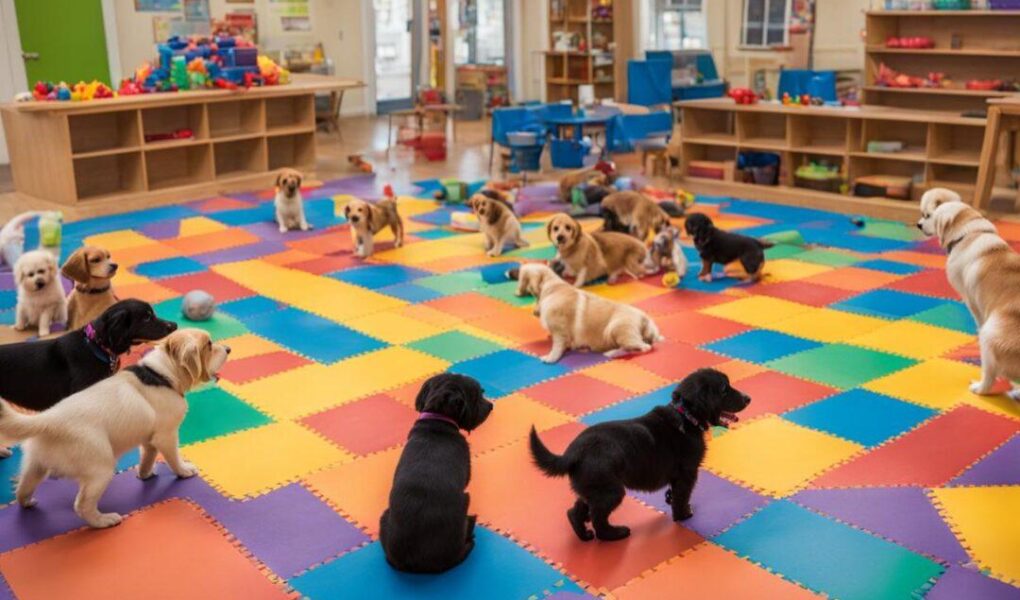Are you a new puppy parent, eager to set your furry companion on the path to becoming a well-mannered canine citizen? The journey begins not just with love and patience, but also with the right guidance. Enter puppy preschool—a vibrant and engaging environment designed to nurture young pups through socialization, training, and play. If you’re wondering how to find a puppy preschool near you, you’ve come to the right place. In this article, we’ll explore the benefits of these early learning experiences, what to expect from a typical program, and tips on choosing the best preschool for your pup. Let’s embark on this exciting adventure together, ensuring your four-legged friend starts life on the right paw!
Table of Contents
- Finding the Right Puppy Preschool for Your Furry Friend
- Essential Skills Your Puppy Will Learn in Preschool
- The Benefits of Early Socialization for Puppies
- Tips for Choosing a Local Puppy Preschool That Fits Your Needs
- Q&A
- Insights and Conclusions
Finding the Right Puppy Preschool for Your Furry Friend
When searching for the ideal preschool for your puppy, consider a few essential criteria to ensure a nurturing environment for your growing friend. Look for facilities that offer a well-structured curriculum emphasizing socialization, basic commands, and positive reinforcement techniques. A good preschool should provide a safe and clean space where your pup can explore, play, and learn under the watchful eye of experienced trainers. Always check if the instructors are certified and have a track record of successfully training young dogs.
Another crucial aspect is the puppy-to-instructor ratio. A lower ratio generally means more personalized attention for each puppy, allowing them to flourish in their learning experiences. Be sure to inquire about the types of activities included in their syllabus; these may consist of social playtime, agility exercises, and even troubleshooting behavioral challenges. To help you decide, here’s a quick comparison of important characteristics:
| Characteristic | Ideal Option | What to Avoid |
|---|---|---|
| Instructor Certification | Certified Trainers | Unqualified Personnel |
| Puppy-to-Instructor Ratio | Less than 5:1 | More than 10:1 |
| Curriculum Focus | Socialization & Commands | Only Obedience Training |
Essential Skills Your Puppy Will Learn in Preschool
Enrolling your puppy in preschool sets the stage for a well-mannered and happy companion. During these formative weeks, your furry friend will learn essential skills that will shape their behavior for years to come. Some of the key lessons include:
- Basic Commands: Sit, stay, come, and down are foundational commands that every dog should know.
- Socialization: Interacting with other dogs and people helps reduce fear and anxiety, leading to a more confident pup.
- Leash Training: Puppies will learn to walk nicely on a leash, making walks enjoyable for both you and your pet.
- House Training: Consistency in training helps teach puppies where it’s appropriate to relieve themselves.
Beyond these vital commands, preschool also emphasizes the importance of making learning fun through interactive play. The environment encourages exploration and curiosity, allowing puppies to build confidence and learn about their surroundings. Notable skills developed during this time include:
| Skill | Description |
|---|---|
| Impulse Control | Teaching puppies to wait for their turn during playtime. |
| Handling and Grooming | Getting used to being touched and groomed, which is essential for vet visits. |
| Problem-Solving | Engaging puppies in games that stimulate their minds and encourage thinking. |
The Benefits of Early Socialization for Puppies
Early socialization is crucial in shaping a puppy’s future behavior and temperament. Puppies are like sponges, soaking up experiences and learning how to interact with the world around them. By exposing them to a variety of environments, people, and other animals during their critical developmental period, pet owners can foster well-rounded companions. Some key advantages of early socialization include:
- Reduced Fear and Anxiety: Puppies that encounter diverse situations early on are less likely to develop fear-based reactions as adults.
- Improved Communication Skills: Through interactions with other dogs and people, puppies learn proper doggy etiquette and how to express themselves.
- Enhanced Adaptability: A well-socialized puppy can adjust better to changes in surroundings, making them more resilient in various situations.
Investing time in a structured puppy preschool can significantly amplify these benefits. These programs often provide a safe environment where puppies can explore and interact under the guidance of trained professionals. During these sessions, puppies are exposed to different stimuli and scenarios, which helps to solidify their learning. The table below highlights some advantages of enrolling in puppy preschool:
| Benefits of Puppy Preschool | Description |
|---|---|
| Social Opportunities | Puppies get to play with their peers, learning to engage positively with other dogs. |
| Training Basics | Owners receive guidance on fundamental commands and behavioral cues, setting the groundwork for future training. |
| Owner Support | Accessible resources for owners to address and understand behavioral challenges effectively. |
Tips for Choosing a Local Puppy Preschool That Fits Your Needs
Finding the perfect puppy preschool requires a bit of research and consideration to ensure it aligns with your puppy’s needs and your own expectations. Start by assessing the qualifications and experience of the trainers. Look for programs that prioritize positive reinforcement techniques and have staff members certified in canine behavior. Additionally, check the class size—smaller groups often lead to more personalized attention for your pup, which can enhance their learning experience. Visit facilities to get a sense of the environment; it should feel welcoming, clean, and safe for your furry friend.
Another important factor is the curriculum offered. A well-rounded preschool should cover socialization, basic obedience skills, and address any specific behavioral issues you may have noticed in your puppy. Don’t hesitate to ask potential preschools about their training methods and what kind of activities are included in their classes. Consider checking out reviews and testimonials from other pet owners to gauge satisfaction levels. Additionally, you might find it helpful to inquire about flexible scheduling options and whether they offer puppy playdates or other enrichment activities to foster a community amongst pet owners.
Q&A
Q&A: Puppy Preschool Near Me
Q1: What is puppy preschool, and why should I consider enrolling my puppy?
A1: Puppy preschool is a structured program designed for young dogs, typically between 8 weeks and 5 months old, to help them socialize, learn basic obedience commands, and experience new environments. Enrolling your puppy in preschool can enhance their confidence, reduce anxiety, and prevent behavioral issues later on. Plus, it’s a fantastic opportunity for you and your pup to bond while meeting other dog parents!
Q2: How do I find puppy preschools near me?
A2: To find the perfect puppy preschool nearby, start by searching online with phrases like “puppy preschool near me” or “puppy training classes in [your location].” Checking social media platforms and community boards can also yield recommendations. Don’t forget to ask your veterinarian for suggestions, as they often have valuable insights on local training programs.
Q3: What should I look for in a good puppy preschool?
A3: When searching for a puppy preschool, consider the following factors:
- Trainers’ Qualifications: Look for experienced trainers with certifications in dog training and behavior.
- Class Size: Smaller class sizes often allow for more individualized attention.
- Curriculum: Ensure the program covers crucial socialization, basic commands, and playtime with other puppies.
- Safety Measures: A clean, safe environment is essential. Look for preschools that have proper safety protocols in place.
- Socialization Opportunities: Puppies should have the chance to interact with peers and different environments.
Q4: What is typically covered in a puppy preschool curriculum?
A4: A good puppy preschool curriculum typically includes basic commands like “sit,” “stay,” and “come,” as well as house training tips. Socialization exercises are key, exposing puppies to various people, sounds, and experiences to facilitate adjustment to the real world. Playtime is also essential for learning canine body language and developing bite inhibition.
Q5: How often do classes meet, and how long do they last?
A5: Most puppy preschools hold classes once a week for about 1 to 2 hours each session. Programs usually run for 4 to 8 weeks, depending on the specific curriculum. Check the schedule before enrolling to ensure it fits your lifestyle.
Q6: Are there any age restrictions for puppies in preschool?
A6: Generally, puppy preschool is designed for puppies aged 8 weeks to around 5 months. This age range is crucial for social development, so it’s the best time to introduce them to new experiences. However, if you have an older puppy, many trainers offer intermediate or advanced classes that could still benefit your furry friend!
Q7: What can I do if I can’t find a puppy preschool near me?
A7: If you’re struggling to find a local puppy preschool, consider online training options. Many professional trainers offer virtual classes that cover similar material and socialization techniques. Alternatively, you can create your own socialization plan at home, involving outdoor outings, playdates with vaccinated dogs, and basic training exercises.
Q8: Can I attend the classes with my puppy?
A8: Yes! Most puppy preschools encourage pet parents to actively participate in classes. Your involvement not only helps reinforce learning for your puppy but also strengthens the bond between you two. Plus, it’s a perfect chance to connect with other dog owners and share experiences!
Q9: How much should I expect to pay for puppy preschool?
A9: The cost of puppy preschool can vary widely depending on location, trainer experience, and class length. Generally, you can expect to pay anywhere from $100 to $300 for a complete course. Remember, investing in early training can save you money in the long run by preventing behavioral issues later on.
With this guide, you are now well-armed to embark on your puppy’s preschool journey. Your pup is sure to thank you with wagging tails and happy barks!
Insights and Conclusions
As you embark on the journey of finding the perfect puppy preschool near you, remember that this crucial early stage of your furry companion’s life lays the foundation for their future behavior, social skills, and overall happiness. With the right nurturing environment, dedicated trainers, and a curriculum tailored to your pup’s needs, you can help ensure that they grow into a well-adjusted and confident dog. So take the time to explore your local options, connect with other dog owners, and, most importantly, enjoy this exciting chapter together. Your adventurous puppy awaits – and with a little guidance, they are sure to thrive in whatever life brings their way!


